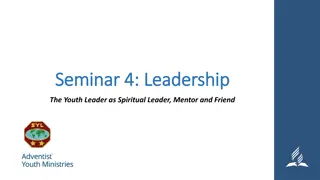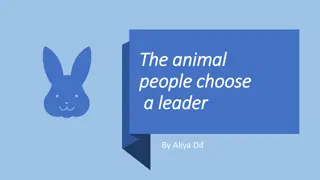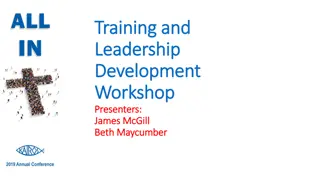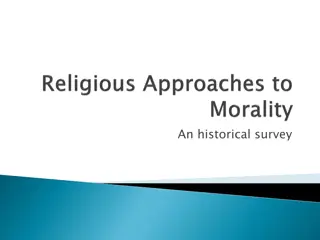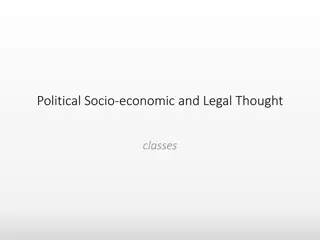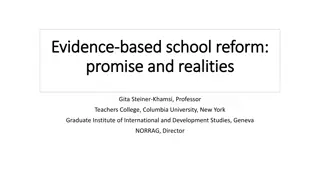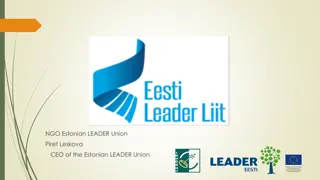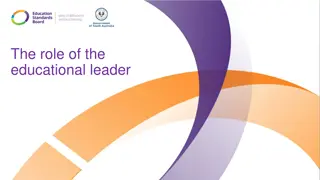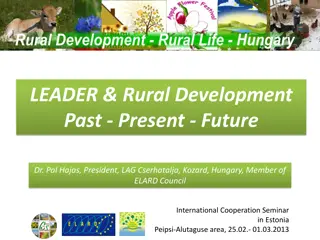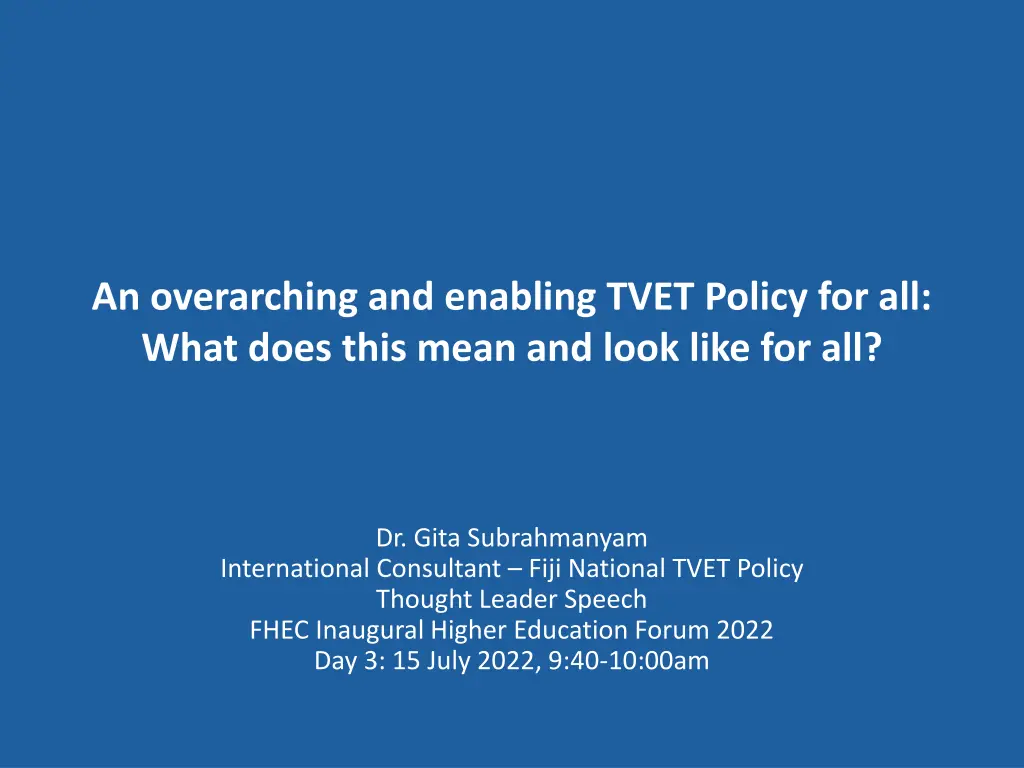
Enabling TVET Policy Implementation in Fiji: Progress and Planning
Discover the evolution of Fiji's National TVET Policy, from its inception in 2020 to the current progress and planned stages of work. Explore the key stakeholders involved, the methodology endorsed, and the strategic approach towards drafting a comprehensive TVET policy for sustainable development.
Download Presentation

Please find below an Image/Link to download the presentation.
The content on the website is provided AS IS for your information and personal use only. It may not be sold, licensed, or shared on other websites without obtaining consent from the author. If you encounter any issues during the download, it is possible that the publisher has removed the file from their server.
You are allowed to download the files provided on this website for personal or commercial use, subject to the condition that they are used lawfully. All files are the property of their respective owners.
The content on the website is provided AS IS for your information and personal use only. It may not be sold, licensed, or shared on other websites without obtaining consent from the author.
E N D
Presentation Transcript
An overarching and enabling TVET Policy for all: What does this mean and look like for all? Dr. Gita Subrahmanyam International Consultant Fiji National TVET Policy Thought Leader Speech FHEC Inaugural Higher Education Forum 2022 Day 3: 15 July 2022, 9:40-10:00am
About me QUALIFICATIONS CAREER TRAJECTORY TVET POLICY WORK BSc Economics (Finance), University of Pennsylvania Investment Manager (Goldman Sachs, etc) Youth employability & sustainable development (UNESCO-UNEVOC, AfDB) MSc Public Policy & Admin, London School of Economics Lecturer/Researcher (LSE, University of London) Enhancing TVET relevance (UNESCO Bangkok) PhD and Postdoc Fellowship, London School of Economics International Development Policy Consultant TVET Policy Reviews (Haiti/IDB, Afghanistan/Sida)
Fiji National TVET Policy - background Sept 2020: UNESCO Office for Pacific States intervention Advice to Technology and Employment Skills Testing (TEST) Section of MEHA to support National TVET Policy plans Support provided during UNESCO 2020 intervention: o Webinar on Developing an effective TVET policy (Nov 2020) o Scoping paper providing guidance, based on international experience, on issues to consider when developing a national TVET policy in Fiji (Dec 2020) Nov 2020: Expansion of stakeholders involved (FHEC, FNU, APTC and MEHA) to establish a TVET Policy Working Group
Fiji National TVET Policy progress since 2020 Further expansion of stakeholders involved in TVET Policy Working Group (FCEF, NTPC, NEC/MEPIR, MYS, USP) Regular TVET Policy Working Group meetings International & National Consultants appointed and began work (June 2022) Work plan and methodology endorsed by Working Group Stakeholder mapping methodology endorsed by WG Initial stakeholder consultations commenced (FCEF/APTC Industry Engagement Forum & FHEC Higher Education Forum)
Fiji National TVET Policy planned stages of work 1. Endorsed work plan and methodology 2. Stakeholder mapping 3. Strategy for stakeholder consultations 4. Stakeholder consultations 5. Drafting of National TVET Policy (WG approval at each stage) Desktop review/contextual analysis setting out main issues to be addressed Development of key pillars based on desktop review and stakeholder consultations Development of policy objectives for achieving agreed pillars Development of policies relating to TVET governance and funding 6. Final stakeholder consultations on draft TVET Policy for validation 7. Finalisation of National TVET Policy and drafting of final Cabinet paper 8. (Post-endorsement) Stakeholder training and awareness sessions
Key pillars - policy pointers from TESTs website Vision Unlocking Quality Technical Education for a skilled and prosperous Fiji Three priority areas Youth employment and entrepreneurship Equity and gender equality Transition to green economies and sustainable societies Linked to GoF s5-Year and 20-Year National Development Plan: Transforming Fiji Inclusive socio-economic development Nurturing of new and emerging growth sectors, including green growth Improved productivity through accelerated human capital development Wider use of new technologies
Three analytical lenses for transforming TVET: UNESCO Strategy for TVET, 2016-2021 UNESCO (2016) Strategy for Technical and Vocational Education and Training, 2016-2021 (Paris: UNESCO)
Case for focusing on TESTs three priority areas Youth employment and entrepreneurship: Fiji suffers from high youth unemployment, while at the same time industry partners complain of a lack of suitably skilled Fijian workers Issue: lack of relevance --> negative returns on investment Note: Relevance must not be confused with quality Equity and gender equality: Less than 1/3 of students enrolled in TVET programmes in Fiji are female Access to TVET is more restricted in remote areas of Fiji (Note: ICT could help) Issue: economic growth potential not maximised, plus low social equity Transition to green economies and sustainable societies: 5-Year & 20-Year National Development Plan lists climate change, green growth and the environment as critical cross-cutting issues Fiji has experienced average annual losses of around 5% of GDP due to floods and tropical cyclones (2018 Climate Vulnerability Assessment) Issue: Not yet harnessing TVET s potential for mitigating climate change impacts and contributing to sustainability
Five most important skills/characteristics for workers to have over the next 10 years UNESCO-UNEVOC (2020) UNESCO-UNEVOC trends mapping study on the future of TVET teaching (Bonn: UNESCO-UNEVOC)
Essential building blocks of effective TVET systems 1. Leadership and clarity of purpose across policy domains 2. Labour market relevance and demand-driven provision 3. Well-functioning partnerships and networks 4. Well-resourced TVET institutions delivering high-quality training 5. Well-recognised qualifications in a framework offering access, pathways and portability of qualifications 6. Stable and sustained financing 7. Well-functioning institutions with accountability mechanisms 8. High public esteem based on successful outcomes 9. Availability of accurate data and information, including LMI 10. Culture of policy learning and continuous improvement UNESCO and ILO (2018) Taking a whole of government approach to skills development (Paris/Geneva: UNESCO/ILO)
Vinaka vaka levu! Thank you for listening! 11


